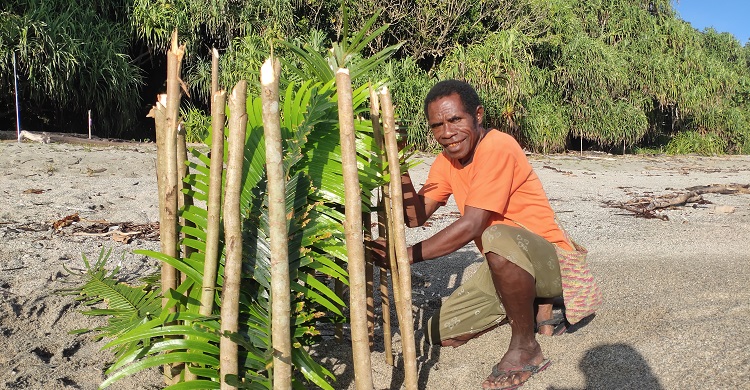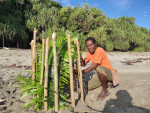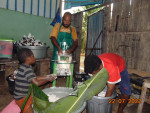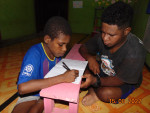Benefits of a Marine Turtle Conservation Project to Local Communities in an Impoverished Region in Papua, Indonesia

A local patroller protected a leatherback nest threatened by high sand temperatures and predators using fern leaves and an enclosure © S4C LPPM UNIPA
by Deasy Lontoh and Fitryanti Pakiding
The Jeen Womom Coastal Park, on the northwest coast of West Papua, hosts approximately 3500 marine turtle nests yearly. Leatherback nests are the most abundant, followed by olive ridley, green, and hawksbill. The Coastal Park was established in 2017 to protect the most important nesting beaches of Pacific leatherbacks, Jeen Yessa (formerly Jamursba Medi) and Jeen Syuab (formerly Wermon). Large-scale egg harvest at these beaches occurred between the 1970s and 1990s, and among other factors has contributed to the decline in marine turtle numbers at Jeen Womom.
Local communities living near and within the Jeen Womom Coastal Park are one of the poorest in Indonesia. West Papua is one of the poorest provinces in the country, and the Tambrauw regency, where these communities are located, is one of the poorest regencies in West Papua. Twenty-two percent of Tambrauw residents live in extreme poverty, defined as living on less than 1.90 USD per day. Tambrauw also has a low Human Development Index (HDI) of 53.45 (West Papua HDI: 65.09 and Indonesia HDI: 71.94). Thus, improving the capacity and livelihood of local communities becomes an integral part of the strategy to promote a lasting marine turtle conservation project.
The State University of Papua (UNIPA) has been leading the region's marine turtle research and conservation. One key component of UNIPA's holistic approach is the community empowerment program, which helps build the capacity of local communities through mentorship. UNIPA community workers live in the four villages for ten months a year. They assist local students in improving their reading, writing, math, basic English, and computer skills in the House of Learning. They also help train community members to turn coconut, one of the region's primary commodities, into high-quality coconut oil that can be marketed in nearby cities.
We kept a record of each local community member receiving education and financial benefits between 2019 and 2021. We learned that more than 100 local students attend our House of Learning every year, and at least 53% showed marked improvement in reading, writing, and basic math. On average, 97 local community members received 47,086 USD per year through UNIPA's nesting beach and community empowerment programs, providing them with an additional 1.33 USD per day. Local community members benefit directly through employment at the nesting beaches as local patrollers. They also receive financial benefits when providing services such as relocating threatened nests, building a hatchery, transporting logistics by boat, etc. Through the community empowerment program, UNIPA purchases the high-quality coconut oil and noken (traditional Papuan knit bag) produced by local community members and helps market them in Manokwari. Our conservation project benefits over 200 local community members yearly (approximately 24% of the total population living near Jeen Yessa and Jeen Syuab beaches). Because of this, the project gains broad support from the local community.
We continue diversifying our ways to support the local economy and capacity building. This year, we have an internship program for local youth at the nesting beach. In addition, we train local community members on how to make other coconut-derived products and teach local students basic computer skills. We believe that strong support from the local community is key to the long-term success of our marine turtle conservation project.
Last updated on 07 September 2022






